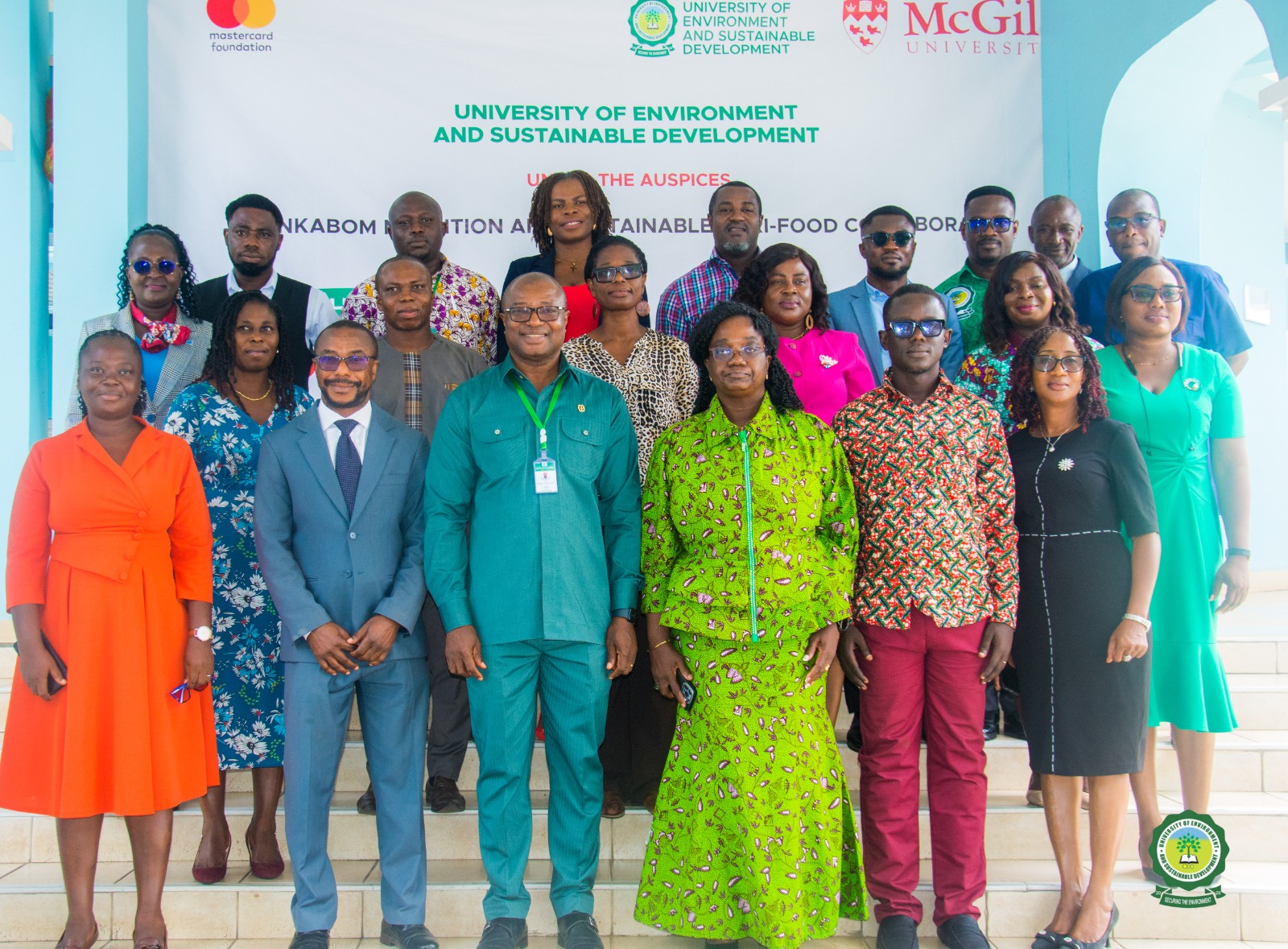A three-day inception workshop to plan the implementation of the ‘Nkabom’ Project for the University of Environment and Sustainable Development (UESD) has opened in Koforidua, the Eastern Regional capital. The workshop brought together members of the Project Management Committee, made up of experts in agro-waste management, aquaculture, entrepreneurship, academia, and research and other fields.
The initiative, “Nkabom(means togetherness in Akan): Nutrition and Sustainable Agri-food Collaborative,” is a ten-year project designed to provide dignified and fulfilling work for three million Ghanaian youth by 2030. Its key project partners are UESD, Koforidua Technical University (KTU), Kwame Nkrumah University of Science and Technology (KNUST), University of Ghana (UG), University of Health and Allied Sciences (UHAS), Ashesi University, Association of Ghana Industries (AGI), in partnership with McGill University, Canada and Mastercard Foundation.
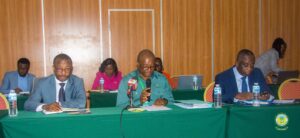
The initiative, “Nkabom(means togetherness in Akan): Nutrition and Sustainable Agri-food Collaborative,”, is a ten-year project designed to create dignified and fulfilling work opportunities for three million Ghanaian youth by the year 2030. The project is a collaborative effort between UESD, Koforidua Technical University (KTU), Kwame Nkrumah University of Science and Technology (KNUST), University of Ghana (UG), University of Health and Allied Sciences (UHAS), Ashesi University, and the Association of Ghana Industries (AGI), in partnership with McGill University, Canada, and the Mastercard Foundation.
At UESD, the focus is on developing an Agro-Waste Management and Aquaculture Technology Entrepreneurship Initiative. This initiative aims to address critical challenges that lie at the intersection of environmental sustainability, agricultural innovation, youth employment, and inclusive development in Ghana.
Principal Investigator: Delivering his inaugural speech, which was also attended by Management members of UESD, the Principal Investigator of the project and Vice-Chancellor of UESD, Professor Eric Nyarko-Sampson, emphasised the project’s commitment to reimagining agro-waste as a valuable resource and aquaculture as a sustainable source of livelihood. He noted that Ghana, like many nations around the world, faces a confluence of challenges, including rising youth unemployment, underutilized agricultural by-products, unsustainable aquatic food systems, and the urgent need for sustainable job creation. According to him, what is required is an integrated, multi-sectoral approach that is both locally grounded and globally informed, which is precisely what the Nkabom project seeks to achieve.
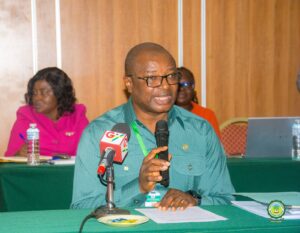
Prof. Nyarko-Sampson further explained that the project represents a holistic intervention that combines education, research, skills training, entrepreneurship, and policy dialogue. He reiterated UESD’s determination to empower the next generation of environmental stewards, agri-tech innovators, and community leaders. The project, he said, will not only equip young people with knowledge but also provide them with the tools, practical skills, and platforms necessary to act and make a difference. He emphasised that UESD’s strategic location in Somanya, at the heart of the Eastern Region, places the University at a unique intersection of rural innovation, community engagement, and environmental stewardship. He called on participants to bring forward innovative ideas to maximize the impact of the project.
Over the three days, the workshop is expected to provide a platform for strategic alignment, finalisation of curriculum frameworks and training models, co-design of research activities, and establishment of monitoring and evaluation systems. Presentations will be delivered by project leads in agro-waste, aquaculture, entrepreneurship, monitoring and evaluation, research, community engagement, and communication. Expected outcomes from the workshop include a comprehensive inception report, a detailed project work plan, a curriculum framework for both tertiary and non-tertiary programmes, a draft research agenda, a communication strategy, a stakeholder engagement plan, a monitoring and evaluation framework, a baseline study proposal, and a structured entrepreneurship support toolkit.
Project Overview:
The Pro-Vice-Chancellor of UESD and Project Coordinator, outlined the strategic objectives of the Nkabom Project, which are organised under three key pillars: Education and Capacity Building, Access and Inclusion, and Entrepreneurship Development.
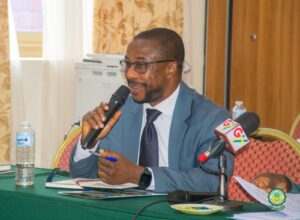
He explained that under the education and capacity-building pillar, the project seeks to develop human capital through the creation of new academic programmes at the tertiary level, including Bachelor of Technology degrees in Agro-Waste Processing and Aquaculture, followed by Master’s and Ph.D. programmes. Short-term, non-tertiary training programmes in waste bioprocessing, aquaculture management, and entrepreneurial development will also be designed and delivered. These academic initiatives will be complemented by experiential learning opportunities such as workshops, laboratory sessions, community-based internships, and Training of Trainers (ToT) programmes to ensure sustainable knowledge transfer and local ownership.
Speaking on access and inclusion, Prof. Wiafe Debrah stressed that the Nkabom Project is committed to making its interventions accessible and inclusive. Scholarships and bursaries will be provided to women, youth from rural communities, refugees, and persons with disabilities. Wrap-around support programmes, including mentorship initiatives, career counselling, and services promoting equity, diversity, and inclusion (EDI), will be developed. Special admission pipelines will be established to ensure equitable participation for underserved groups.
Regarding entrepreneurship development, the project aims to launch tailored entrepreneurship training modules for the agro-waste and aquaculture sectors. It will also facilitate community-based enterprise development for out-of-school youth and emerging entrepreneurs, promote dual internship models that combine local and international placements, and support the creation and growth of micro-, small-, and medium-sized enterprises within the project’s focus areas.
Prof. Wiafe Debrah highlighted that the Nkabom Project is expected to make a substantial impact by training over 340 youth in agro-waste processing and aquaculture technologies, creating at least 150 direct and indirect jobs in rural communities, improving the livelihoods of marginalized groups, enhancing food security, reducing environmental pollution, and fostering national policy dialogue and innovation through academic-industry collaboration. The project’s outcomes are designed to contribute directly to several Sustainable Development Goals (SDGs), particularly those addressing No Poverty, Zero Hunger, Gender Equality, Decent Work and Economic Growth, Responsible Consumption and Production, and Climate Action.
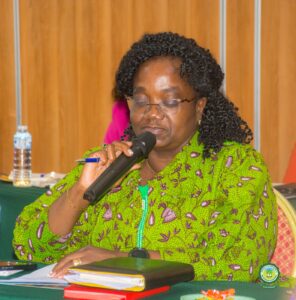
The Registrar of UESD and Project Administrator, Mrs. Mary Abena Agyepong, expressed her excitement about the project’s prospects and the anticipated gains it will bring to the university and the country at large. Professor John Owusu, Vice-Chancellor of Koforidua Technical University(KTU), also passed through the workshop, reinforcing the strong commitment of partner institutions.
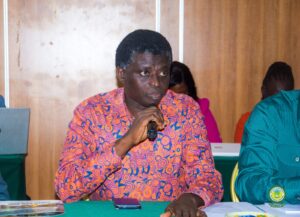
Activities for Day One of the workshop focused on project launch and strategic alignment under the theme “Framing the Vision – Aligning Objectives and Expectations.” Key activities included an overview presentation of the agro-waste, aquaculture, and entrepreneurship initiatives, strategic planning sessions to map work packages and objectives, roundtable discussions to develop the structure of curricula and short courses, and breakout sessions where participants presented templates and frameworks for curriculum design.
Day Two, under the theme “Building Blocks – Curriculum, Entrepreneurship, Research, and Systems,” involved break-out sessions focused on curriculum co-design for tertiary and non-tertiary programmes, planning research workstreams and summer schools, entrepreneurship programme planning, and administrative and governance capacity-building plans. Discussions also addressed the development of policies around diversity, gender equity, and EDI.
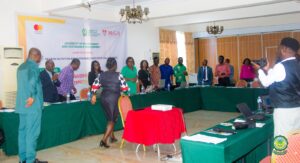
The final day of the workshop, scheduled for Wednesday, 30th April 2025, carries the theme “Making It Happen – Action Plans.” The day’s activities will involve a recap of discussions and outcomes from Day Two, finalisation of the monitoring and evaluation framework and baseline study planning, development of the communication and visibility strategy, and strategies for community engagement to ensure the success of the project.

